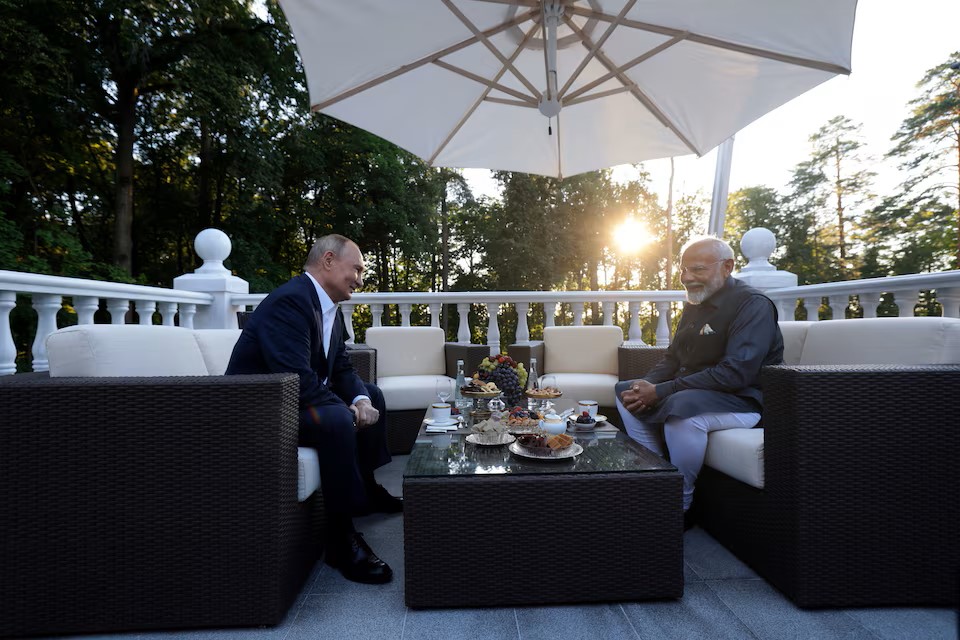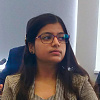Unity and Friendship: A Personal Account of Modi’s Visit to Moscow
In
Log in if you are already registered
“Privet Moskva! Kak dela?” asked Prime Minister Narendra Modi, as he took the stage to address the large Indian diaspora that had gathered to see him in Moscow. A couple of months have passed, yet the takeaways of Modi’s trip to Moscow remain evident. Over the last few years, more and more Indians have come to Russia to open new businesses, seek educational opportunities, and learn more about their partner country. When hearing Modi’s friendly greeting, his enthusiastic audience roared back, “Privet! Vse khorosho!”

Source: Reuters
Regardless of current tensions within international relations, this warm response never proved to be more genuine and reflective of the relationship between the two countries: the bond between Russia and India has never been stronger. Modi’s decision to visit Moscow during such contentious times sparked a range of emotions around the world: for Russians, his visit sent a clear message of support and friendship, as many witnessed the Prime Minister’s close relationship to Russian President Vladimir Putin, both of whom exchanged sincere and friendly conversations. As for the West, Modi’s visit brought a wave of skepticism, concern, and even envy, as recent developments in India’s relationship with Russia have increasingly become scrutinized by the US and its allies. As for Indians living in Russia and abroad, Modi’s trip proved both exhilarating and encouraging; his presence reconnected the Indian diaspora with its home country and resolidified Russia’s importance to India as not just a strategic partner, but a dear historic friend.
Prime Minister Modi arrived in Moscow on July 8, 2024, but the preparation for his visit had started as soon as his visit was first announced. Since Saturday – July 6, 2024 – the Carlton Hotel on Tverskaya street – where Modi and his delegation stayed for two days – bustled with Indians, as the media and official delegates started to arrive in Moscow. Media control rooms were set up, and many Indian volunteers appointed by the Embassy of India in Moscow aided the media and incoming guests, providing access to key information regarding Modi’s visit and helped visitors communicate with Russian locals and the hotel staff. The result: a lively atmosphere of cultural exchange and a sense of kinship between the Russian and Indian people. The many Indian restaurants that have emerged in Moscow over the years were busy preparing menus for the guests, as Russians worked hand in hand with their Indian counterparts to plan out the nuances of the visit. It was incredibly heartening to see how actively engaged the Russian community was; children made posters to welcome the Prime Minister, and Russian artists learned traditional Indian dances and music to perform for the guests. Russian experts on India and Russian Hindi speakers were enthusiastically preparing for the arrival, providing many interviews for Indian media outlets.
Such an atmosphere is so often left unnoticed around the non-Western world. What many miss – given the limited presence of Western news outlets – is the sincerity Russians exemplified before, during and after Modi’s visit. The scope of those involved in preparing for Modi’s visit expanded far beyond politics: people from different professional backgrounds – students, businessmen, homemakers, etc. – appeared excited and played a significant role in the preparations. The involvement of the Indian and Russian communities transformed Modi’s visit, giving it the appearance of a country and people that were welcoming a dear friend, rather than just another political figure on a state visit.
Outside the hotel, the Prime Minister and his delegation were greeted by both the Indian diaspora and Russians, who were holding posters and playing music. Inside the hotel, Prime Minister Modi was welcomed with a garba (an Indian dance form) performance by Russian artists, as the sound of schoolchildren chanting “Modi, Modi” warmed the hearts of all that were there. Indian External Affairs Minister, Dr. Subrahmanyam Jaishankar and National Security Advisor Shri Ajit Doval also accompanied Prime Minister Modi during his visit and were likewise welcomed with excitement and energy. In the evening, Prime Minister Modi and President Putin held an informal meeting at Putin’s residence in Novo-Ogaryovo. The two leaders embraced each other upon meeting, displaying and reaffirming their sincere friendship. Though engaging political leaders during visits is a typical affair, the professional and personal thought that was put into Modi’s visit reveals how close the relationship between the two leaders – and their people – goes beyond the level of politics.
Perhaps the most symbolic moment of Modi’s visit was on July 9, 2024, when Modi addressed the Indian diaspora in Moscow. His speech proved nothing less than inspiring, speaking both in Hindi and Russian to showcase not only his linguistic skills, but the importance of learning partner languages to drive cultural exchange. Additionally, it symbolized how interconnected the two people and two cultures have become. However, the most monumental moment of Modi’s speech was when he touched an emotional chord of the Indian diaspora, stating that with his visit, he brings not only himself and his delegation, but the essence and spirit of India, to comfort Indians abroad and share this essence with “our Russian friends”.
Modi highlighted key trends taking place in India – Russia relations, greatly acknowledging the contribution of the Indian diaspora in Russia in strengthening India’s imagine abroad and establishing friendly relations between the two nations. The diaspora’s ability to organize and host several events celebrating different Indian festivals and Indian culture plays a significant role in strengthening people-to-people ties. It has spread awareness about India to Russia, about its society and culture and vice versa. For example, Hindustani Samaj (one of the oldest Indian cultural organizations in Russia) holds Hindi translation competitions, encouraging Russians to learn Hindi. Also, the Indian National Cultural Centre-SITA organizes annual Holi Mela celebrations, allowing Russians to witness the beauty and fun that goes into Indian festivals. With every passing day, it has become more common to hear famous Bollywood songs pouring out of Russian stores and restaurants, and more Russians are becoming familiar with famous Indian stars like Raj Kapoor and Mithun Chakraborty. Aside from the movie industry, songs, actors, and characters act as a motor in India-Russia soft power and cultural exchange, and this fact did not go amiss in Narendra Modi’s speech.
Modi also reflected on his personal relations with President Putin, stating facts and figures about the number of times he has visited Russia, the number of times President Putin visited India, and the number of times they met each other overall. He expressed immense gratitude when President Putin helped in the safe evacuation of Indian students from Ukraine and thanked him once again for his efforts. In many ways, this nod to Ukraine, and the absence of any criticism throughout Modi’s visit, reflects a crucial element in India’s approach to its foreign policy: non-interference. The policy of non-interference between India and Russia dates to the Cold War era, when a newly independent India was a looking for a partner who would support the young nation without infringing on its sovereignty. Russia, often seen as the successor of the USSR, has historically aided India throughout various crises and conflicts, and Modi’s lack of scrutiny against Russia in a period when the entire Western world has denounced the country, reflects the gratitude and respect India has for Russia, both historically and politically.
Considering other diplomatic developments in the India-Russia relationship, Prime Minister Modi announced the agreement to establish consulates in the Russian cities of Kazan and Yekaterinburg. He also mentioned the historic importance of the city of Astrakhan in the Indo-Russian relations, recalling the settlement of traders from the Indian states of Gujarat, Punjab, Sindh, and parts of Rajasthan in the 17th century. He also mentioned the arrival of the first commercial consignment in Astrakhan from the North-South Transport Corridor that linked the port cities of Mumbai and Astrakhan. By comparing past developments with those of the present, Modi used India’s close economic history with Russia to hint at the direction of its future relations. Modi also noted other economic and educational developments; for instance, he mentioned the Chennai-Vlapostok maritime corridor, and encouraged to resume the Ganga Volga Dialogue of Civilizations Conferences, the first of which took place in the beginning of 2020. These conferences boost discussions amongst experts on trade, culture, education, innovation, etc., between India and Russia and provides a platform for the two countries to bring their cooperation to fruition.
Taking his speech to a more personal level, Modi reflected that the Indian people are an emotional people; once they feel connected to someone, they continue to believe in that connection forever. This noted trait is embedded within Indian culture, tracing back to the tales of the Mahabharata, where Karna fought against the Pandavas for his best friend, even after knowing that they are his own brothers. Like in the tale, India is willing to support a trusted friend in need, regardless of how difficult it may be. Modi even states that when Indians hear the word “Russia'', they should think of a “partner in joy and sorrow, a trusted friend”. Even though India practices non-interference in its foreign policy, it does not equate India to simply not being involved with Russia. In fact, India embraces the challenge that sanctions, in particular, have brought – seeking ways to further develop its bilateral relations, yet do so carefully, without directly involving itself in the conflict in Ukraine.
The most significant takeaway from Modi’s visit to Russia is how the personal relationship between the leaders of the two countries reflects the deepening relationship between the people. With every passing day, both Indians and Russians are learning more about each other, their culture, history, etc. With learning comes experience, and with experience comes trust; this trust fuels stronger people-to-people relations and provides more opportunities for both nations to work together and benefit from bilateral political, social and economic cooperation. When concluding his speech, Modi asked the audience to repeat and complete the national slogans of “Bharat mata ki Jai” and “Vande Mataram”. There can be no greater symbolism that reflects the deepening relations between Russia and India than to hear the echoes of these slogans fill the hall at the Carlton Hotel and pour into the streets, and hearts of Moscow.




